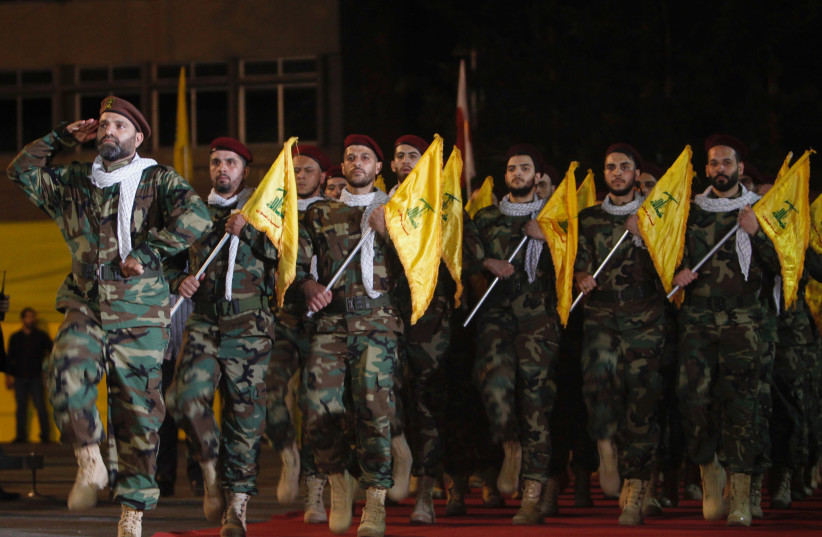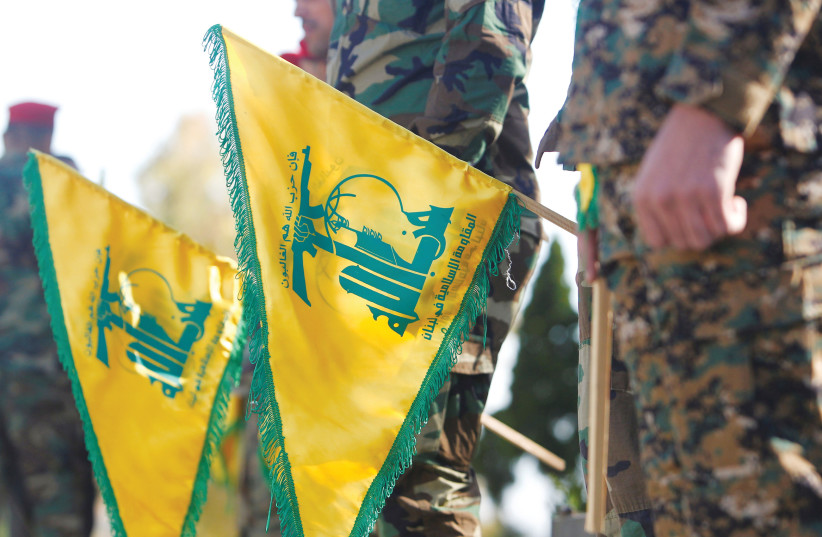There is an ongoing discussion in the IDF leadership about whether a major flare-up with Hezbollah is inevitable and when, whether it would be smart to launch a preemptive strike or be better to delay the conflict for as long as possible, and only respond to an attack by the Iran-backed Lebanese terrorist organization.
Hezbollah’s intentions are the focus of attention in the top echelons of the defense establishment, since Hezbollah’s more than 150,000 rockets are viewed by the IDF as a greater near-term threat than even Iran. But there are proxy debates for that larger issue.
Currently and more imminently, top IDF commanders are debating whether to use force to remove a relatively insignificant (in terms of size) and meaningless (in terms of danger) a tiny Hezbollah outpost of a couple of tents intruding into Israeli territory in the disputed Mount Dov area – and if using force, how much and how soon?
Virtually all top officers agreed that attempting to convince Hezbollah to remove the outpost using diplomacy through UNIFIL was the initially preferred option.
But after a period of weeks had passed, and certainly after the whole issue became public over a month ago, a growing number of IDF senior officers want to swiftly end the saga with force, and without further delay. Some even implied to The Jerusalem Post that an operation was due to take place last week, but clearly they have not won the debate yet.

Others still prefer a much more extended negotiation, even some more months, with the hope that if the issue fades from media coverage, Hezbollah can eventually be prevailed upon to withdraw, especially if offered some inducements.
Confronting Hezbollah over the outpost makes the most sense
These two issues are quite connected. For those who see war with Hezbollah as inevitable, as coming sooner than later, and who prefer a preemptive strike, confronting Hezbollah over the outpost sooner makes the most sense.
They see less fear of accidentally setting off an unnecessary war, because these commanders tend to assume a bigger war is just a matter of when and not if. In that case, they would rather Israel take the initiative, set the playing field and be able to take the advantage of surprise.
Removing fewer than 10 Hezbollah soldiers from Israeli territory should be relatively simple for the entire IDF. Why would it be so important to act now against the outpost and to initiate broader action against Hezbollah?
Why would it be so important for certain officials to act now against the outpost and to initiate broader action against Hezbollah?
OC Northern Command Maj.-Gen. Uri Gordon has said that, in the early days of the next war with the terrorist group, Hezbollah will be able to rain down around 4,000 rockets per day on Israel’s North, including Haifa, Tiberias, and other key locations.
The Post has learned that the numbers could be even higher at the very start. Gordon has said that, even after a longer conflict, Hezbollah could keep up a rate of 1,500-2,000 rockets per day.

To give readers context for those numbers, during the 2014 Gaza War, the IDF said that Hamas fired around 4,500 rockets at Israel over the entire 50-day period, or around 90 a day.
This past May, Islamic Jihad in Gaza managed to fire 1,234 rockets on Israel in four days, or around an average of 308 rockets per day.
IDF commanders who want to strike preemptively believe that Hezbollah’s initial 4,000 or more rockets could be significantly reduced when the IDF counterattack has put Hezbollah on its heels, has blown up significant communications arrays and has already destroyed some of its most precise long-range weapons.
During the 2006 Second Lebanon War, the air force destroyed several dozen long-range and more powerful rockets in the opening minutes of the conflict – before the terrorist group had a chance to think about launching them.
The Post understands that the IDF’s intelligence penetration of Hezbollah and its weapons layout is several times deeper now than in 2006. Some of these senior officers argue that removing the outpost with confidence may deter Hezbollah from war. In contrast, other IDF commanders view Hezbollah chief Hassan Nasrallah as the most deterred leader Israel faces.
Whereas Gaza terrorist groups have sparked several larger conflicts with Israel over the past 15 years, and multiple ones in the last three years, and Iran and its Syrian proxies are constantly trying to open a new front against Israel on the Golan border, Nasrallah has kept the Lebanese border quiet since 2006.
True, they admit that in the last half year, Nasrallah has gambled with sending a terrorist to perpetrate an attack in Megiddo in March, and had a variety of low-grade altercations with IDF border-adjustment crews, and allowed Palestinian terrorists to fire small numbers of rockets from his domain into Israel.
But while the IDF commanders who are sure war is inevitable take all of the above Nasrallah gambles as signs that he is truly readying for war, other senior officers believe that these weak gambles betray Nasrallah’s unwillingness to risk a major conflict. They would say that Israel went to war by accident and unintentionally in 2006 with Nasrallah and 2014 and 2021 with Hamas.
These IDF commanders worry that, if Nasrallah loses too much face in too large a way, the same mistake could happen in 2023 with a war that was not inevitable. With Hezbollah’s capabilities able to harm Israel’s civilian home front far more than ever before (even if Israel “wins” militarily), they view taking any risk that could lead to a general war as a grave error.
Given that Mount Dov is surrounded by Israeli forces and nowhere near Israeli civilians, they see no specific rush in resolving what many say was itself an accident by low-ranking Hezbollah personnel on the front, which Nasrallah only learned of and decided to back after-the-fact.
Israel’s fate then may be intertwined with what happens to these fewer than 10 Hezbollah terrorists and their flimsy outpost.
